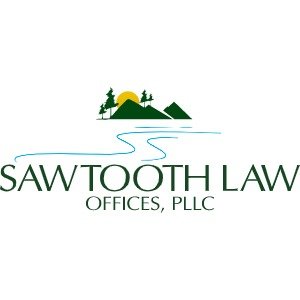Best Debt & Collection Lawyers in Idaho
Share your needs with us, get contacted by law firms.
Free. Takes 2 min.
Or refine your search by selecting a city:
List of the best lawyers in Idaho, United States
About Debt & Collection Law in Idaho, United States
Debt and collection law in Idaho governs how creditors and collectors can seek repayment from individuals or businesses who owe money. These rules aim to ensure that debt collection practices remain fair while protecting consumer rights. The laws cover the process of collecting overdue bills, the rights of debtors, and the limitations on what collectors can do when attempting to recover debts. Both state and federal laws, such as the Fair Debt Collection Practices Act (FDCPA), apply in Idaho, shaping what collectors may and may not do in their communications and collection efforts.
Why You May Need a Lawyer
There are many situations where seeking the advice of a qualified attorney can help you navigate debt and collections issues. You may need a lawyer if you are facing aggressive collection tactics, lawsuits filed by creditors, or threats of wage garnishment or bank account seizure. Legal assistance can also be crucial if you are experiencing harassment by debt collectors, are unsure about your rights and obligations, or are considering bankruptcy as a possible solution to overwhelming debts. Additionally, businesses needing to collect on accounts receivable may seek legal help to ensure they follow Idaho law and maximize recoveries.
Local Laws Overview
Idaho debt collection is regulated by both federal and state law. At the state level, the Idaho Collection Agency Act (ICAA) requires collection agencies to be licensed and sets limits on their activities. Collectors cannot threaten violence or use obscene language, misrepresent amounts owed, or contact you at unreasonable hours. Idaho also sets a statute of limitations on how long creditors can pursue legal action for unpaid debts, which varies depending on the type of debt but is generally five years for written contracts and accounts. Idaho courts will not enforce a debt after the statute of limitations expires, though collectors may still attempt to collect it voluntarily. Garnishments in Idaho are also subject to certain limitations to protect a portion of a debtor's income and assets.
Frequently Asked Questions
What protections do I have from debt collector harassment in Idaho?
Under both Idaho law and the federal FDCPA, you are protected from abusive, deceptive, or unfair collection activities. This includes prohibiting threats, repeated calls meant to harass, and misrepresentation of the amount owed.
Can a debt collector contact me at my workplace?
Collectors may contact you at your workplace unless you or your employer inform them your employer disapproves. Once notified, collectors must stop contacting you at work.
How long can a creditor or collector pursue an old debt in Idaho?
The statute of limitations for most debts based on written contracts is five years in Idaho. After this period, collectors cannot take legal action to enforce repayment through the court system.
Can my wages be garnished for unpaid debts?
Yes, but only after a creditor has obtained a judgment against you in court. Idaho law limits the amount that can be garnished from your wages to protect a portion of your income.
What should I do if I am sued by a collector?
You should respond to the lawsuit promptly and seek legal advice. Do not ignore court papers, as failing to respond may result in a default judgment against you.
Am I responsible for my spouse’s debts in Idaho?
Idaho is a community property state, meaning spouses may share liability for debts incurred during the marriage, even if only one spouse signed for the debt. However, there are some exceptions.
Is there help if I cannot pay my debts?
If you cannot pay your debts, you may negotiate with creditors, seek credit counseling, or, in severe cases, consider bankruptcy. An attorney or certified credit counselor can provide guidance.
Do debt collectors need a license in Idaho?
Yes, collection agencies must be licensed through the Idaho Department of Finance to legally collect debts in the state.
How do I dispute a debt I do not owe?
You should send a written dispute to the collector within 30 days of first contact. Collectors must then verify the debt before continuing collection efforts.
Can debts affect my credit report?
Yes, unpaid debts may be reported to credit bureaus, negatively impacting your credit score. Idaho typically follows federal guidelines regarding how long negative marks can remain on your credit report.
Additional Resources
Several resources are available to assist with debt and collection issues in Idaho:
- Idaho Department of Finance - Oversees licensing and regulation of collection agencies
- Idaho Legal Aid Services - Provides free or low-cost legal assistance to eligible individuals
- Federal Trade Commission (FTC) - Offers information and complaint services regarding debt collection
- Consumer Financial Protection Bureau (CFPB) - Provides consumer protections and complaint resolution for debt collection
- Idaho State Bar Lawyer Referral Service - Connects individuals with qualified legal professionals
Next Steps
If you are facing debt and collection issues in Idaho, the first step is to keep thorough records of all communications with creditors and collectors. Educate yourself about your rights under both state and federal law. If you are unable to resolve the issue directly or are facing legal action, strongly consider contacting an attorney with experience in debt and collections. Legal professionals can review your situation, advise you on the best course of action, and represent you in court if necessary. You may also reach out to non-profit credit counseling agencies for additional guidance. Taking prompt action can help protect your rights and minimize financial and legal consequences.
Lawzana helps you find the best lawyers and law firms in Idaho through a curated and pre-screened list of qualified legal professionals. Our platform offers rankings and detailed profiles of attorneys and law firms, allowing you to compare based on practice areas, including Debt & Collection, experience, and client feedback.
Each profile includes a description of the firm's areas of practice, client reviews, team members and partners, year of establishment, spoken languages, office locations, contact information, social media presence, and any published articles or resources. Most firms on our platform speak English and are experienced in both local and international legal matters.
Get a quote from top-rated law firms in Idaho, United States — quickly, securely, and without unnecessary hassle.
Disclaimer:
The information provided on this page is for general informational purposes only and does not constitute legal advice. While we strive to ensure the accuracy and relevance of the content, legal information may change over time, and interpretations of the law can vary. You should always consult with a qualified legal professional for advice specific to your situation.
We disclaim all liability for actions taken or not taken based on the content of this page. If you believe any information is incorrect or outdated, please contact us, and we will review and update it where appropriate.
Browse debt & collection law firms by city in Idaho
Refine your search by selecting a city.










